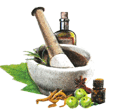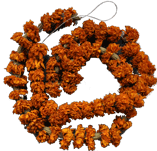... newer stories
THE TIMES OF INDIA
6. Februar 2013
Quecksilberverbot könnte Ayurveda hart treffen
 Varanasi: Die Fakultät für Ayurveda der Banares Hindu Universität (BHU), ist besorgt, dass die alte Ayurveda-Medizin zusammenbricht, wenn ein globales Handelsverbot mit Quecksilber verhängt wird (UN Enviroment Programm). Dabei bedenke man nur die Schädlichkeit, ohne zu realisieren, dass die anorganische Form und Sulfide von Quecksilber eine breite Anwendung bei der Herstellung von ayurvedischen Arzneimitteln haben. Rund 140 Länder unterstützen das Quecksilber-Handelsverbot der Umweltrisiken wegen. Indien hat keine eigenen Minen für die Gewinnung von Quecksilber. Es wird für industrielle und medizinische Anwendungen importiert. - derzeit aus Italien.
Varanasi: Die Fakultät für Ayurveda der Banares Hindu Universität (BHU), ist besorgt, dass die alte Ayurveda-Medizin zusammenbricht, wenn ein globales Handelsverbot mit Quecksilber verhängt wird (UN Enviroment Programm). Dabei bedenke man nur die Schädlichkeit, ohne zu realisieren, dass die anorganische Form und Sulfide von Quecksilber eine breite Anwendung bei der Herstellung von ayurvedischen Arzneimitteln haben. Rund 140 Länder unterstützen das Quecksilber-Handelsverbot der Umweltrisiken wegen. Indien hat keine eigenen Minen für die Gewinnung von Quecksilber. Es wird für industrielle und medizinische Anwendungen importiert. - derzeit aus Italien.
Das Reinigungsverfahren und Kalzinierung von Quecksilber, um es unbedenklich für den Einsatz in der Medizin zu machen, ist rund 1500 Jahre alt und nur in Indien bekannt. "Es gibt acht verschiedene Prozesse durch die das Quecksilber geht, bevor es in der Medizin verwendet wird. Die Westler sind sich dessen nicht bewusst ", sagte Anand Chaudhary vom BHU. „Auch wir unterstützen das Handelsverbot wegen der Schädlichkeit von Quecksilber für die Umwelt. Aber eine Ausnahme für die ayurvedischen Medikamente ist erforderlich. Quecksilber kann gefährlich sein für die Gesundheit und die Umwelt, wenn es in Form von Dampf, organischer oder anderen Formen verwendet wird, ohne die verschiedenen Stufen der Reinigung zu durchlaufen. Wir wissen, dass Quecksilber falsch angewendet zu schweren Schäden der DNS und Neuron-Degeneration führen kann ", fügte er hinzu.
>> Rasa shastra oder die Wissenschaft des Rasa ist das Rückgrat der ayurvedischen Medizin. "Rasa" oder "Parada" sind dabei zwei der vielen unterschiedlichen Bezeichnungen für Quecksilber. Es ist dort äußerst beliebt als ein „Entgiftungsmittel“, dass der Reinigung des Blutes dienen soll. (Yogavahiin Ayurveda).
Mercury ban may hit Ayurveda
Varanasi: Faculty of Ayurveda, Banares Hindu University (BHU), ist worried that the ancient Ayurveda system of medicine may collaps if a global ban (UN Enviroment Programm) is imposed on the trade of mercury, considering only its harmfulness and without realising that the inorganic form and sulphides of mercury have wider application in the preparation of Ayurvedic medicines. Around 140 countries are supporting the ban on the trade of mercury due to environmental risk. India has no mines for the extraction of mercury. It is imported for its industrial and medicinal uses. At present, the stock come from Italy.
The method of purification and calcinations of mercury to make it harmless for use in medicines is around 1500 years old and known only in India. “There are eight different processes throught which the mercury has to under go before using it in medicines. The westerners are not aware of it”, said Anand Chaudhary from BHU. “We also support the ban, accepting the harmfulness of mercury to the environment. But an exemption is required for the Ayurvedic medicines. Mercury can be dangerous to health and environment if used in vapour form, organic or other forms without undergoing various stages of purification. The mercury used wrongly can lead to severe damage to the DNA and neuron degeneration”, he added.
>> Rasa shastra or the Science of Rasa, is the backbone of Ayurvedic Alchemy. "Rasa" or "Parada" are two of the many names given to mercury. Mercury has become popular in Ayurveda medicine as a detoxifying agent which is meant to cleanse the blood (Yogavahiin Ayurveda)..
TOI
Quecksilberverbot könnte Ayurveda hart treffen
 Varanasi: Die Fakultät für Ayurveda der Banares Hindu Universität (BHU), ist besorgt, dass die alte Ayurveda-Medizin zusammenbricht, wenn ein globales Handelsverbot mit Quecksilber verhängt wird (UN Enviroment Programm). Dabei bedenke man nur die Schädlichkeit, ohne zu realisieren, dass die anorganische Form und Sulfide von Quecksilber eine breite Anwendung bei der Herstellung von ayurvedischen Arzneimitteln haben. Rund 140 Länder unterstützen das Quecksilber-Handelsverbot der Umweltrisiken wegen. Indien hat keine eigenen Minen für die Gewinnung von Quecksilber. Es wird für industrielle und medizinische Anwendungen importiert. - derzeit aus Italien.
Varanasi: Die Fakultät für Ayurveda der Banares Hindu Universität (BHU), ist besorgt, dass die alte Ayurveda-Medizin zusammenbricht, wenn ein globales Handelsverbot mit Quecksilber verhängt wird (UN Enviroment Programm). Dabei bedenke man nur die Schädlichkeit, ohne zu realisieren, dass die anorganische Form und Sulfide von Quecksilber eine breite Anwendung bei der Herstellung von ayurvedischen Arzneimitteln haben. Rund 140 Länder unterstützen das Quecksilber-Handelsverbot der Umweltrisiken wegen. Indien hat keine eigenen Minen für die Gewinnung von Quecksilber. Es wird für industrielle und medizinische Anwendungen importiert. - derzeit aus Italien.Das Reinigungsverfahren und Kalzinierung von Quecksilber, um es unbedenklich für den Einsatz in der Medizin zu machen, ist rund 1500 Jahre alt und nur in Indien bekannt. "Es gibt acht verschiedene Prozesse durch die das Quecksilber geht, bevor es in der Medizin verwendet wird. Die Westler sind sich dessen nicht bewusst ", sagte Anand Chaudhary vom BHU. „Auch wir unterstützen das Handelsverbot wegen der Schädlichkeit von Quecksilber für die Umwelt. Aber eine Ausnahme für die ayurvedischen Medikamente ist erforderlich. Quecksilber kann gefährlich sein für die Gesundheit und die Umwelt, wenn es in Form von Dampf, organischer oder anderen Formen verwendet wird, ohne die verschiedenen Stufen der Reinigung zu durchlaufen. Wir wissen, dass Quecksilber falsch angewendet zu schweren Schäden der DNS und Neuron-Degeneration führen kann ", fügte er hinzu.
>> Rasa shastra oder die Wissenschaft des Rasa ist das Rückgrat der ayurvedischen Medizin. "Rasa" oder "Parada" sind dabei zwei der vielen unterschiedlichen Bezeichnungen für Quecksilber. Es ist dort äußerst beliebt als ein „Entgiftungsmittel“, dass der Reinigung des Blutes dienen soll. (Yogavahiin Ayurveda).
Mercury ban may hit Ayurveda
Varanasi: Faculty of Ayurveda, Banares Hindu University (BHU), ist worried that the ancient Ayurveda system of medicine may collaps if a global ban (UN Enviroment Programm) is imposed on the trade of mercury, considering only its harmfulness and without realising that the inorganic form and sulphides of mercury have wider application in the preparation of Ayurvedic medicines. Around 140 countries are supporting the ban on the trade of mercury due to environmental risk. India has no mines for the extraction of mercury. It is imported for its industrial and medicinal uses. At present, the stock come from Italy.
The method of purification and calcinations of mercury to make it harmless for use in medicines is around 1500 years old and known only in India. “There are eight different processes throught which the mercury has to under go before using it in medicines. The westerners are not aware of it”, said Anand Chaudhary from BHU. “We also support the ban, accepting the harmfulness of mercury to the environment. But an exemption is required for the Ayurvedic medicines. Mercury can be dangerous to health and environment if used in vapour form, organic or other forms without undergoing various stages of purification. The mercury used wrongly can lead to severe damage to the DNA and neuron degeneration”, he added.
>> Rasa shastra or the Science of Rasa, is the backbone of Ayurvedic Alchemy. "Rasa" or "Parada" are two of the many names given to mercury. Mercury has become popular in Ayurveda medicine as a detoxifying agent which is meant to cleanse the blood (Yogavahiin Ayurveda)..
TOI
... link (0 Kommentare) ... comment
... older stories



